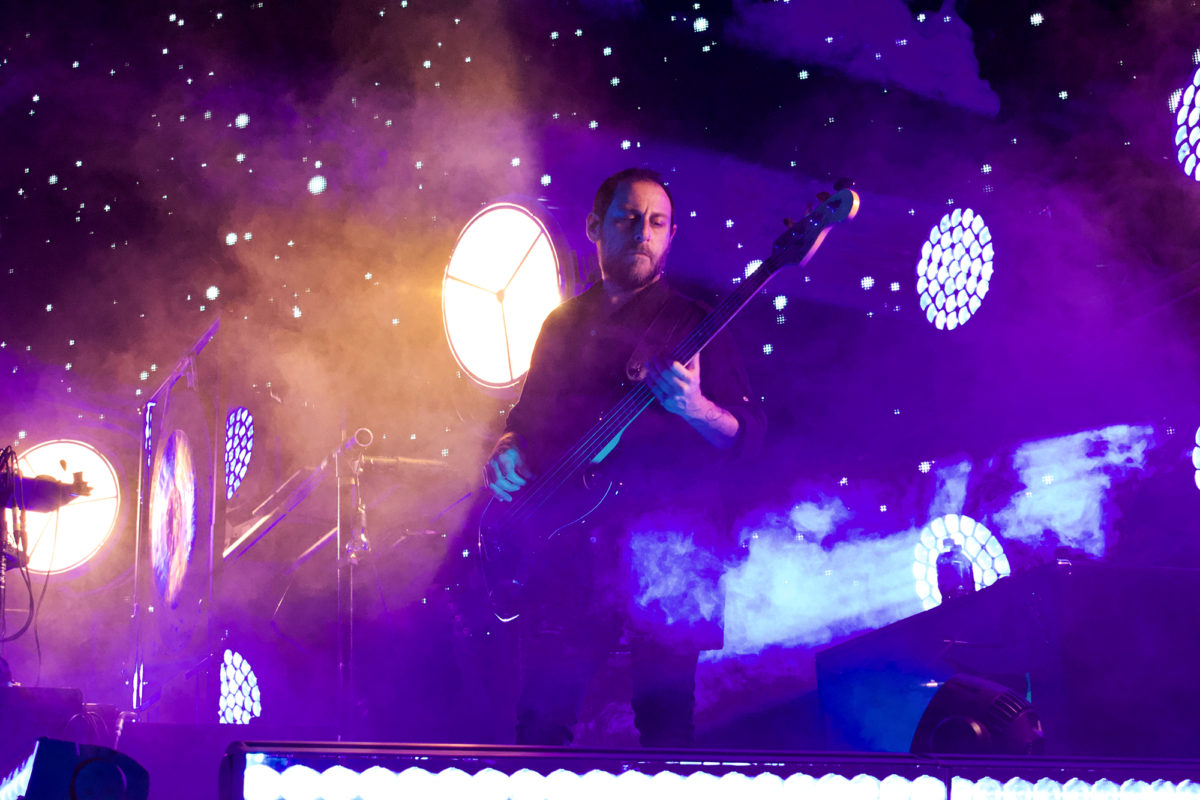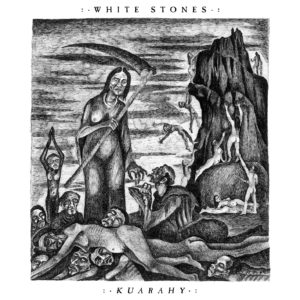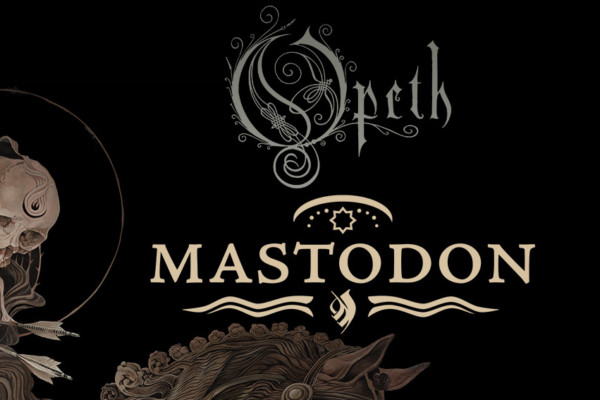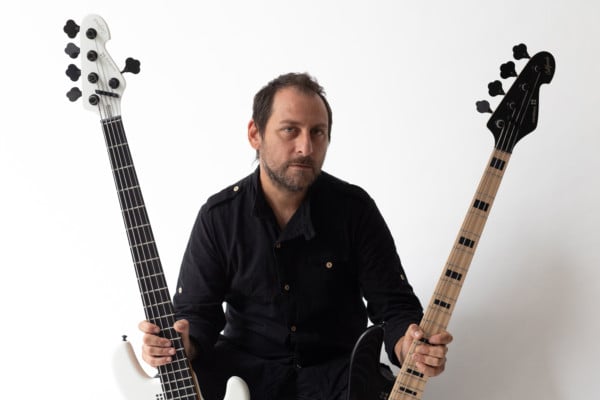Kuarahy: An Interview with Martin Mendez

Martin Mendez joined Opeth just months after arriving in Sweden from his native Uruguay 23 years ago. Since then, he’s become the second most tenured member of the progressive metal group and a staple of the band’s sound. After more than two decades with the group, he’s started his own project called White Stones, which has just released its debut album, Kuarahy.
As with all of his bass lines, you can hear several of Mendez’s influences, but it primarily is a display of his love of death metal. He performed all the bass and guitar parts on the album (save for the solos), enlisting vocalist Eloi Boucherie and drummer Jordi Farré to fill out the songs. Since the recording, he tapped guitarists Albert Martí and Joao Sassetti to create a touring lineup. They’re scheduled to perform at the Prognosis Festival in Eindhoven, Netherlands, which has been postponed to later this year.
We caught up with Mendez at an Opeth show at The Fillmore in Silver Spring, Maryland to get the scoop on his new band, his work with Opeth, and his new Sandberg signature bass.
Kuarahy is available now on CD, vinyl and as a digital download (iTunes and Amazon MP3).
Do you think of White Stones as a band or a solo project?
I think it’s a band. I mean, I’m writing the music and doing the stuff but I consider it a band.
What sparked you to do it now? I know you wrote it in the time after [Opeth’s 2016 album] Sorceress, and you also recently moved to Barcelona. Was that linked?
I guess it helps. The situation I was surrounded by made it happen because I moved to a place where the singer of the band was my neighbor and he had a studio in the neighborhood. So I had the studio kind of for free, all the time I wanted, so that made it easier.
I have always been writing music, but this time… I don’t know. I think it’s a combination of that maybe and that we’re touring a bit less with Opeth now. Back in the day, we used to do longer tours where we were out for two months and then we would get home for a week and then go out again. Now it’s different. We have a little more time between the tours at home and they are shorter. Time is important for doing this stuff. It takes a lot of time to make a record, write music and so I guess it’s a combination of that.
Do you like having the extra time or do you like being on the road?
I like to play live. I love it. But I like to be at home. I mean, when you’re home, it feels like you have time to do proper things. Being on tour is really repetitive, you know, doing the same, same, same. Even if I love it, you feel like you’re wasting a little bit of time.
How do you like to stay sane when you’re on the road for so long? Do you have hobbies or anything to keep you busy?
I have two kids to start with, so when I’m home I’m daddy, so I spend all day with them as much as I can. But I always have a musical project of some kind. I like to draw as well and to paint. I haven’t done it in a few years now, but it’s something that I like to do. I used to be a carpenter back many years ago, so I still love working with wood.
Is there a theme that ties Kuarahy all together?
 Yes and no. I mean, there is a core kind of concept for the album. Everything started when I named the band for the place I grew up in back in Uruguay where I was born. I have always been interested in the natives from that area. “Kuarahy” means “sun” in the language called Guaraní, which is what the natives from the area that is Uruguay today spoke. Today it is only in Paraguay that they still speak in this language – the only country in the world I think. But yeah, it’s kind of nostalgic in some way. When I started writing the music, I kind of started to remember all the past and feel it.
Yes and no. I mean, there is a core kind of concept for the album. Everything started when I named the band for the place I grew up in back in Uruguay where I was born. I have always been interested in the natives from that area. “Kuarahy” means “sun” in the language called Guaraní, which is what the natives from the area that is Uruguay today spoke. Today it is only in Paraguay that they still speak in this language – the only country in the world I think. But yeah, it’s kind of nostalgic in some way. When I started writing the music, I kind of started to remember all the past and feel it.
Did something spark that?
It’s a special time when you’re young, you know. I remember I discovered death metal then and I started playing music then. I think it’s a nice way to share these feelings with the music.
Do you sit down with the bass or the guitar to write music?
It depends. I think most of the songs I start with a guitar. I play a lot of guitar at home. But it depends – some songs I started with the bass some with the guitars, but usually with a guitar.
One thing about your music is that I feel like there’s an interesting mixture of influences. Sometimes I’m hearing neo-classical, sometimes I’m hearing blues, sometimes I’m hearing Black Sabbath. What kind of musicians do you call influences?
I didn’t think of anything special I wanted to sound like when I was writing the music, but I think our influences are always there. I have influences from many styles of music and influence from everything. Yes, I listen to a lot of folk music and blues, jazz, or rock. I think it reflects in the music but it’s nothing like I’ve been thinking about.
The vocalist, Eloi, is the same friend that has the studio. How did you meet him?
He is an old friend of my girlfriend. And when I moved to Barcelona, I met these people and they had a band, as well. We were just music freaks, everybody, so we kind of connected. I’ve known him for a few years, and he was my neighbor at the time. We were pretty close.
You recorded most of the album on your own, but since then you’ve put together a touring band. Are they band members or just for touring?
Yes, I would say they’re band members. Well, the people that made the record are me, Eloi the singer, and Jordi the drummer. Then we have the two guitar players for live shows, upcoming albums or whatever.
Part of the description from a press release was that if you’re a fan of older Opeth and of Morbid Angel, you’ll enjoy this music. Do you think that’s fair?
I guess you can hear the influences. As I said, I never planned to sound like anything else, and even more, I never thought I wanted to sound like Opeth. I mean, it’s nothing I think about. Of course, I love Opeth and I love Morbid Angel. Morbid Angel is the first death metal band I ever heard and I think it’s the best one ever. So I guess you can hear the influences, of course.
But lately, people are comparing this to Opeth too much, and it’s really nothing to do with Opeth. This project is something completely different. I write the music for [White Stones], and Opeth is [Mikael Åkerfeldt’s]. People are comparing the old Opeth era with this, and it’s not like that. It’s nothing to do with it.
Is that pretty frustrating for you?
It’s not frustrating, but you can get tired of seeing the comments and the questions about it because you never pretend to be doing anything like that. It’s just something completely different. It’s my way of expression in this style of music, so I don’t see the connection.
Also speaking of the new album, are there any bass solos?
Not really. I like playing solos, but I think my kind of style of playing is more normal bass. I love Jaco and all these guys, but I think I feel more comfortable playing just the bass.
Switching to Opeth a little bit, for the latest album, In Cauda Venenum, I read that you mentioned that the mix helped make the bass more present.
Yes. I think it has to do with the guitars not being as heavy as well, but yes, this time that I think was the producer, the studio, and the songs, which were more friendly for the bass compared to the past albums.
Did the recording process for you change at all? Did you use new gear or anything like that?
When we did Heritage, Pale Communion, and Sorceress, I recorded together with the drums. This time we did it separately as we did in the past, and that was because I wanted to concentrate more on the bass sound by trying different basses. I think I’m using six or seven different basses on the whole album. That didn’t happen when I recorded with the drums; I only used one or two basses. It was more about quick playing and getting through the songs. But this time, I wanted to kind of have a look at the sounds of the basses and to have the right sound for each song, so we took the time for that and it was great.
You’ve historically played Fender Jazz, but I know you just got a Sandberg signature bass. How did that come about?
I got in contact with them last summer and they invited me to the workshop. We decided to build a signature so I decided with them how it would look and of the features in it. I’m really happy with it. I was using Sandberg basses like 10 years ago I think, but then I went back to Fender. I love the bass, and I love Sandberg basses. They’re really light and really good sounding. I’m just really happy with this bass.
What kind of things make it your signature? What did you want to get out of it?
Well, I want to have a good bass as cheap as possible, as well. I wanted something that really that fits into my kind of playing. They gave me a bass to try that you can move the pickups back and forth so you can find the right sound. I did that, so the position for the position for the pickups is kind of special because it’s not a regular one for jazz basses. Then I decided on the finishes, the wood, and the shape.
I just got the five-string version. The four-string is white with black hardware. The five-string is black with black hardware, but a maple fingerboard.
Are you a gear head and like really tinkering with everything?
I mean, I have to do it sometimes, but it’s not my thing. I like it as easy as possible.
What else is coming up for you? Can we expect a White Stones tour?
Well, that’s the hope, but it all depends. My main band is Opeth and we work a lot. It all depends on how much touring we do with Opeth. I don’t want to do anything to clash with Opeth, so it will have to have a good time between tours or when we take time off. So there will be some more shows, but I don’t know where or when yet.



Uruguay and Paraguay are two different countries. The musician is from Uruguay and Guarani language is Paraguay’s official language, (even though it is still also spoken in the NE areas of Argentina).